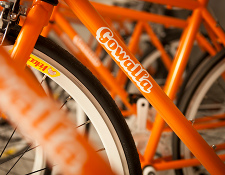 I recently played the best round of golf of my life. It was the first round of golf I'd played in 14 months. Heck, the first time that I'd swung a golf club in 14 months. I was also playing the Ocean Course at Kiawah Resort in South Carolina, the course that Tiger Woods called, "one of the more challenging courses I've ever played." Did I also mention that I was playing with borrowed clubs?
With all of these factors in mind, you can imagine how frustration it was for the other golfer I was paired with who plays twice a week to watch me play as well as I did. It actually appeared to make him play worse, like I was getting in his head on a Sunday round at the Masters. I started feeling bad about it, but not enough to stop me from crushing my 3-Wood 280 yards down the fairway on the 18th hole approaching the club house.
I recently played the best round of golf of my life. It was the first round of golf I'd played in 14 months. Heck, the first time that I'd swung a golf club in 14 months. I was also playing the Ocean Course at Kiawah Resort in South Carolina, the course that Tiger Woods called, "one of the more challenging courses I've ever played." Did I also mention that I was playing with borrowed clubs?
With all of these factors in mind, you can imagine how frustration it was for the other golfer I was paired with who plays twice a week to watch me play as well as I did. It actually appeared to make him play worse, like I was getting in his head on a Sunday round at the Masters. I started feeling bad about it, but not enough to stop me from crushing my 3-Wood 280 yards down the fairway on the 18th hole approaching the club house.
Enough with my not-at-all-humble brags, what is the point of the story? Where is the ego fueled rant headed? There are two things that factored into how well I played that day: What clubs I played with and who I played with.
What I played with: I mentioned I played with a borrowed seat of clubs but I didn't mention that they were brand new Titleists with the biggest sweet spots I've ever seen. I grew up playing on a set of 1967 Wilson blades that I inherited from my 6-foot 5-inch Grandpa Anderson. They had longer shafts which was helpful for my height, but absolutely nothing but a bent piece of metal with grooves as the club face and therefore no forgiveness for my tendency to slice the ball. These Titleists were more forgiving than a soon to be retired priest.
Who I played with: I mentioned the avid golfer that I played with, but I didn't mention that part of the tradition at the Ocean Course is that ever group goes out with a caddy. My caddy was Brandon Hartzell, a semi-pro golfer who just missed the qualifier for this year's U.S. Open. I got to the course early and he accompanied me out to the driving range. At first, I was taken aback by how conversational he was while I was warming up, but what I later realized was that 15 swings into my warm up, he knew my swing better than I did. He watched me go through my irons, then my fairway woods, and then my driver on the practice range and didn't let me pick a club the rest of the day. He knew exactly how far I could hit each club and how I should play each shot. His understanding of my all but hibernated golf game infused me with confidence that I had no business having.
I recently wrote a blog post about only having one gear on my bike and some of the virtue that I have found that raw experience to give me. A good friend and all together more accomplished cyclist, Adam McManus, tweeted back to me that he understood where I was coming from, but also for me to not discount what can happen by working smarter and some day growing up to a bike with gears for all kinds of routes, hills, and distances.
The same could be said for the precision that I used to cling to with my 1967 golf clubs. While both my one speed and ancient clubs require me to be ultimately much more intentional about the way I operate. But, at a certain point, graduating up to the next rung isn't just about raw skill but the honing of the foundation you've built and going deeper into the realms of possibilities by working smarter after having worked harder.
Working smarter and working harder are not mutually exclusive and the best of the best understand how to do both in harmony.
(If you want to read more about the great time that Annie and I had in Kiawah, check out her post on National Geographic HERE)

 Dr. Abraham Maslow put self-actualization at the top of his
Dr. Abraham Maslow put self-actualization at the top of his 
